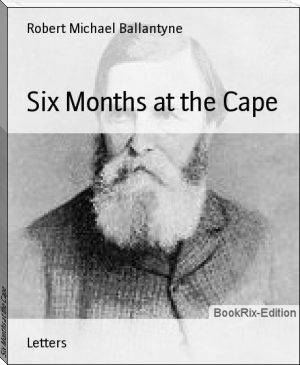Six Months at the Cape - Robert Michael Ballantyne (the little red hen ebook txt) 📗

- Author: Robert Michael Ballantyne
Book online «Six Months at the Cape - Robert Michael Ballantyne (the little red hen ebook txt) 📗». Author Robert Michael Ballantyne
The whole party rose with marvellous celerity, and the sportsmen rushed towards the boundary wall, while Gouws scrambled on his long legs and ran after them. Had the distance been great, their chance of escape would have been small. As it was, Gouws overtook one of the party just as he reached a part of the wall which had been mended with mimosa-thorn bushes. With one tremendous kick he sent the unfortunate man into the midst of the thorns, where he would certainly have given him further punishment had he not been attracted by a yell of alarm from another of the party. Poor Squib was not fleet of foot or active. He made a clumsy attempt to vault the wall, which his companions had already leaped. Leaving his thorn-pierced victim, Gouws made at Squib, applied his huge foot to his person, with a slap that must have forcibly recalled the days of childhood, and sent him over the wall with undignified haste. It is generally believed that Squib has not gone guinea-fowl shooting among ostriches since that day!
The profits on ostrich feathers are very considerable. I do not profess to give statistical information in these pages, but merely touch lightly on what came under my observation. At one farm which I visited near Capetown I was told that the owner had cleared 2500 pounds in one year. Timid men are sometimes alarmed by depressions in the trade in feathers, and some of them have sold off their birds at heavy loss; but bold and hopeful men continue to persevere and prosper, as such men always will in every trade all the world over. That ostrich-farming has been found worthy of zealous attention is proved by the fact that, while in 1865 there were only between eighty and ninety birds in the colony, in 1875 there were upwards of 22,000. [In 1925 there were 239,000.]
Some days afterwards, I pretty well completed my circle of knowledge on this subject by witnessing the birth of an ostrich!
Hobson and I rode that day over to a lovely place named Glenbonny, on the edge of that part of the Karroo where the mountainous lands begin. It was a charming ride of forty miles--there and back--with a pleasant visit, and a rest between. Here dwelt relatives of my friend--a family named Berrington--one daughter of which, (with wealth of golden hair), had been a shipmate on the voyage out. The principal neighbours of this family were tigers and baboons. There was a minor population of deer, hyenas, hares, coneys, monkeys, and moles, but no human beings of any kind. Their dwelling was low and flat-roofed, the walls being coated with mud, so that its aspect outside was not imposing, but inside we found substantial comfort if not luxury, refinement, and hospitality. This is not an infrequent combination in the outlying districts of the Cape, where the nature of life and things is such that wealth, education, and refinement are often found robed in a modest homespun garb, and housed in a mere hut.
Among other objects of interest inside we found ostriches--very little ones--in divers stages of progression. There was one, the size of an ordinary fowl, which had been in existence--after egg life I mean--a few days, and swaggered about the premises like an impudent child. There was another baby--weak in the understanding, physically as well as mentally--which staggered about in a drunken manner, with an insane tendency to use its tail as a support. This creature was kept in existence by having its food forcibly crammed down its throat, the amount given each meal being gauged not by appetite but by the tension of its stomach. Last, and least, there was one which had succeeded in bursting out one end of its native egg that morning. Its already tremendous toes protruded, and were engaged in further efforts to get out when we arrived. While we were at dinner that day the creature effected its liberation, and entered on the staggering and stuffing phase of its career.
All these birds, and many others, had been nursed into life through a hot-air and warm blanket incubator, by the amiable lady of the house, and were destined to spend the early part of their lives under the care of some Hottentot stepmother.
LETTER SIX.
OVER THE PLAINS--LION AND TIGER REMINISCENCES--FRONTIER FORCES AND ESCAPED CONVICTS--MONKEYS AND PRICKLY PEARS--A VETERAN SETTLER'S EXPERIENCES OF KAFIR WARFARE--STORY OF THE DUTCH FARMERS' RISING IN 1815.
It was a sad day that on which I left the Karroo and bade farewell to Ebenezer.
I had gone there in absolute ignorance of men and things, and had found a hearty welcome in the abode of a warm-hearted Christian family and a romantic region, full, to me, of new ideas, experiences, circumstances, and sensations.
Hobson drove me in his cart. Our destination was the mountain region of Baviaans, or Baboons, River.
The first part of our route lay across the Karroo and over the mountain range which separated us from the town of Somerset East. As we sped along, drawn by two powerful horses, over the ocean-like plains, we were silent at first, but gradually the cheering influence of rapid motion and fine weather began to tell. Our spirits rose, and Hobson related numerous anecdotes, historical and adventurous, from the rich stores of a good memory.
About noon we outspanned beside a stream and allowed the horses to have a roll. Under the shade of a bush we lay and chatted, while our eyes roamed over the rolling plains to the blue mountain range which formed its northern boundary.
"There," said my friend, pointing towards the mountains, "is the spot where one of the last lions was seen in this part of the country. There were plenty of them here once, and the last one disappeared in 1840, only thirty-six years ago."
He then related the incident connected with the lion referred to. The following is the substance of it.
Early in the year 1840 a runaway soldier was travelling through that part of the country. He was on his way to Graaff-Reinet in search of work. At that time farmhouses were very few and far between in that region. The wearied soldier came one evening to the house of a Boer named Smit, not many miles from the spot where Hobson and I were reposing.
Smit was a surly fellow, and refused shelter to the traveller, who was therefore obliged to continue his journey during the night. Next day the unfortunate man's mangled body was found not far off, a few yards from the foot of a small tree. The traces revealed clearly that he had been killed by a lion, whose footprints had been seen and voice heard for some time in the neighbourhood. On the approach of the lion the man had sought refuge in the small tree just mentioned, but being little better than a large bush, it failed him in the hour of need. Even when perched on the highest branch that would bear him, he was not beyond the spring of the lion. It had caught him, torn him down, and devoured his breast and arms, after which it left him.
This was the last lion in that region that succeeded in taking human life. Six months later the last lion of all made his appearance. He was evidently a less ferocious animal, and made his final exit in a rather humorous manner. In his prowling about he chanced to find an old Dutchman, and pounced upon him, but the old man had his wits about him. At first sight of his enemy he let himself go limp as if dead. Lions are particular. They don't like dead meals; they prefer to kill their own dinners. After pouncing on his prey the lion put his mouth to the old fellow's ear and roared. If he was not deaf for life after that he ought to have been! At all events he was deaf at the time to the remark, for he paid no attention to it whatever. Then the lion pawed him a little, lay down on him, rolled him about as a cat plays with a mouse, and ultimately couched a few yards off to watch jealously for the slightest sign of life. But the Dutchman was a splendid actor. Even in breathing he managed to remain motionless, and at last the lion sneaked away overwhelmed with disappointment. Then the old man slowly lifted his head, rose, congratulated himself, and returned home in a thankful state of mind.
Although lions had finally taken themselves off, and retired to safer and more distant retreats, the mountain glens of the neighbourhood were, as I have already said, still inhabited by leopards of large size and dangerous temper.
"They are powerful and savage fellows," said my friend, as he rose to inspan, "and few men like to face them unless assisted by a party, and with good dogs. One friend of mine, a doctor, used to boast that he could stare a leopard out of countenance. At last one was caught in a trap, and the doctor tried the experiment, but only got knocked over and his nose scratched for his pains. There was a curious instance, once, of a Fingo going mad in consequence of being bitten by a leopard. The madness took the form of his feigning to be a leopard, and there was no doubt as to his insanity, for he continually growled and scratched and snapped with his teeth, and finished off by jumping through a glass door.--Now then, the cart's ready; in you go."
I jumped in, and off we went again over the sweet-scented plain,--now on a good bit of road, now on a bad; often forsaking the track altogether, and occasionally plunging into holes that knocked our heads against the hood, and tried our springs to the uttermost, till evening at last found us among the hills, where a rough-and-ready inn afforded us shelter for the night.
Passing through Somerset we came to a place named Cookhouse Drift, where there is a bridge over the Great Fish River.
We also met here with seven troopers of the frontier, armed and mounted police, as tight and serviceable a set of young fellows as one could wish to see--clad in corduroy, thorough-going, rough-and-ready colonial cavalry--and well-trained to bush fighting. They were out after seven escaped convicts, and had caught one, a big Kafir, who was handcuffed, and seemed sulky when I looked at him.
At another place, where the prickly pear was very prolific, and the bush so dense that it formed a pretty safe retreat to escaped convicts, as well as baboons and tigers, we discovered a band of Kafirs celebrating a wedding.
The prickly pears, which were ripe at this time, we found to be very pleasant and refreshing, but we had to handle them with care, as they were covered with prickles so fine that they pierced the skin and broke off the pear with the least touch. The great evil of prickly pear thorns is that it is almost impossible to extract them, and although it can scarcely be said that they cause pain, the irritation





Comments (0)